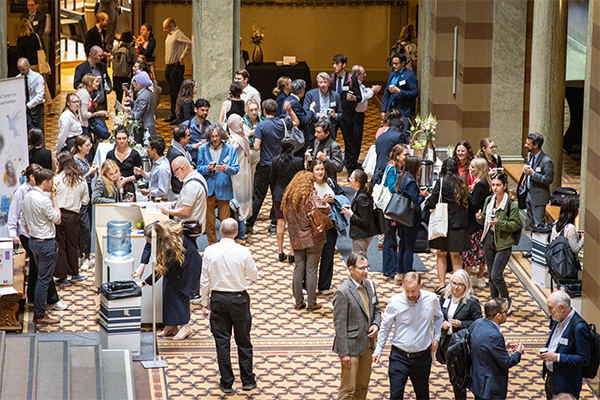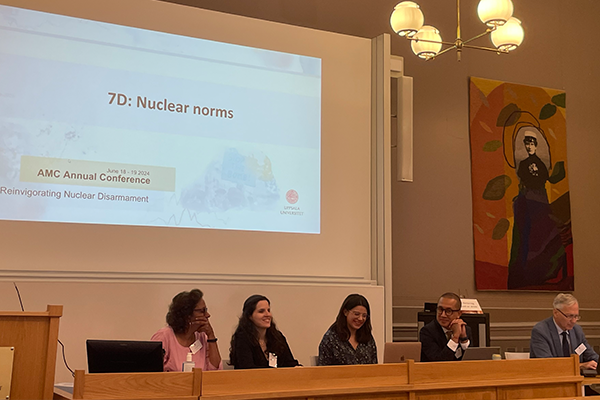Kroc Institute represented at international conference at Uppsala University
With the theme, Reinvigorating Nuclear Disarmament, the third annual Alva Myrdal Centre for Nuclear Disarmament (AMC) Conference took place at Sweden’s Uppsala University June 18-19. It continued to attract a large international audience, including several participants from the Kroc Institute for International Peace Studies, part of the Keough School of Global Affairs at the University of Notre Dame.
Peter Wallensteen, the Richard G. Starmann Sr. research professor emeritus of peace studies at the Kroc Institute and a member of the Kroc Institute advisory board, as well as professor emeritus at Uppsala, was a primary organizer of the conference as was Erik Melander, a former Kroc Institute visiting fellow and the current Director of AMC. Also participating were the Kroc Institute’s George Lopez, the Rev. Theodore M. Hesburgh, C.S.C. professor emeritus of peace studies and Gerard Powers, director of Catholic Peacebuilding Studies and coordinator of the Catholic Peacebuilding Network.

The focus of this year’s gathering was the increasingly urgent developments surrounding nuclear weapons that warrant a critical assessment of the context, challenges, and outlook for nuclear disarmament. The need to reinvigorate efforts stems from the continued lack of attention and development in this area; the conference offered both a platform and forum to move the conversation forward.
“The increased urgency of nuclear tensions requires a closer look at what can be done”, said Wallensteen, who considered this more closely in his conference paper, “Sanctions and Non-Proliferation: Where We Are and Where We Should Go”. “This conference enables us to move beyond simply identifying problems to develop constructive solutions that can be implemented in strategic peacebuilding initiatives. The practical nature of the proposals we hear in the various sessions is critical to shaping future research and practice in this critical area of peace studies”.
The conference introduced the Alva Myrdal Centre Data Project and took up issues surrounding decolonization; diversity and gender; climate, food and health systems as they relate to nuclear studies and disarmament, and considered international case studies from Asia, the Nordic states, and Ukraine, among others. The sanctions working group of AMC also announced the September publication by Routledge Press of Sanctions for Nuclear Disarmament and Non-Proliferation: Moving Forward, Peter Wallensteen and Armend Bekaj, eds.
“What was especially notable was the number of countries represented at this conference,” said Powers, who presented the paper, “Putin vs the Pope: An Ethic of Use or an Ethic of Disarmament?” on the second day. “Also impressive was the wide variety of specialists in attendance and topics addressed – from senior government leaders to disarmament activists tackling topics ranging from AI to nuclear norms.”

Lopez chaired a session on the first day of the conference, assessing the effectiveness of sanctions and taboos for non-proliferation and non-use. Later that day, he joined Wallensteen in a session on sanctions for nuclear disarmament and non-proliferation, and presented the paper, “Sanctions as Tools to Achieve Nuclear Reduction Policy: Is there a Better Way Forward?”
“Not only is the conference distinguished by its international reach, but by the interdisciplinary breadth it encourages and facilitates,” said Lopez. “I had the good fortune of in-depth interactions with other specialists working on sanctions for nuclear non-proliferation. I also attended sessions about research and policy work of physicists, nuclear engineers, and AI specialists - all working on ways to monitor and constrain nuclear developments. This type of interdisciplinarity at a conference is rare.”
The next AMC Annual Conference will be held in June 2025, with a call for proposals open October - November 2024. To learn more, visit https://www.uu.se/en/centre/alva-myrdal/annual-conference.
Originally published by at kroc.nd.edu on July 09, 2024.
Latest Research
- University of Notre Dame and IBM Research build tools for AI governanceMain Building (Photo by Matt Cashore/University of Notre Dame) …
- Smarter tools for policymakers: Notre Dame researchers target urban carbon emissions, building by buildingCarbon emissions continue to increase at record levels, fueling climate instability and worsening air quality conditions for billions in cities worldwide. Yet despite global commitments to carbon neutrality, urban policymakers still struggle to implement effective mitigation strategies at the city scale. Now, researchers at Notre Dame’s School of Architecture, the College of Engineering and the Lucy Family Institute for Data & Society are working to reduce carbon emissions through advanced simulations and a novel artificial intelligence-driven tool, EcoSphere.
- Seven engineering faculty named collegiate professorsSeven faculty members in the Notre Dame College of Engineering have been named collegiate professors—a prestigious title awarded by the university and college in recognition of excellence in research, teaching and service. The designation may be conferred on faculty at the assistant, associate or…
- ‘A special challenge’: German studies scholar wins National Humanities Center fellowship for research on medieval womenFor CJ Jones, the joy of research is not the answers but the journey. And the next step on that journey is a fellowship with the National Humanities Center. …
- Notre Dame Lead Innovation Team partners with local WIC program to identify, prevent lead poisoning in childrenB.A.B.E. store “shoppers” now have something new to help their families: free lead screening kits offered by the University of Notre Dame’s Lead Innovation Team.
- Notre Dame Welcomes Ninth Cohort of Warrior-Scholars for Transformative Academic JourneyNOTRE DAME, IN – The University of Notre Dame recently concluded its ninth successful Warrior-Scholar Project (WSP) boot camp, hosting 34 dedicated Warrior-Scholars from June 21st to 28th. This intensive, week-long academic residency provided transitioning service members and veterans…













